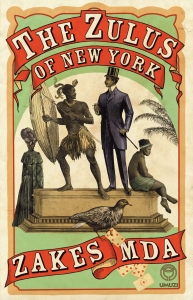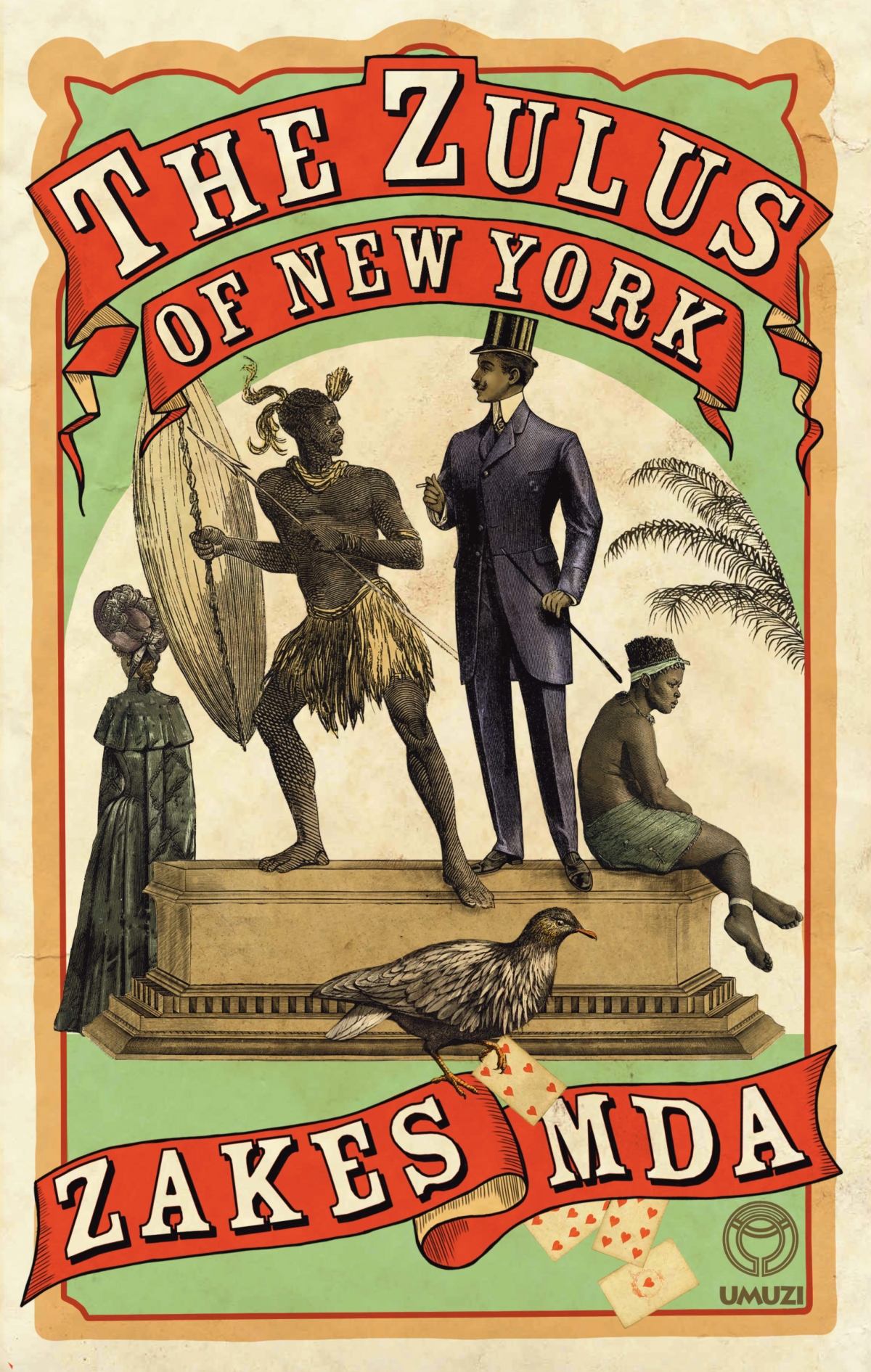
The impresario Farini introduced Em-Pee and his troupe to his kind of show business, and now they must earn their bread. In 1885 in a bustling New York City, they are the performers who know the true Zulu dances, while all around them fraudsters perform silly jigs.
1
New York City – November 1885
The Wild Zulu
“THE WILD ZULU. That’s what the banner says. Crowds line up at Longacre Square to pay their admission fee into an arena encompassed by bales of hay. Some are already sitting on the bales that are randomly placed on the ground, while others are massing in front of an iron cage.
The Wild Zulu sits in the cage and is resplendent in faux tiger skins and ostrich feathers. He is a giant of a man, bigger than any man Em-Pee has seen. He roars and the spectators gasp in anticipation. A Mulatto urchin outside the cage accompanies the rumble with a conga drum and a tambourine.
The spectators are a motley assemblage of dandies who must have strayed from the saloons, peep shows and gambling dens of the nearby Tenderloin, and workmen in overalls on a lunch break from the carriage factories, tanneries, saddleries, harness shops and horse dealerships that pervade the vicinity. Some of the gentlemen, probably out-of-towners, are accompanied by ladies in their finery.
The drummer boy performs a grotesque jig as he beats the conga. He is, however, subdued so as not to steal attention from the main attraction in the cage.
The Wild Zulu’s pecs ripple and his bloodshot eyes protrude and roll out of sync. The impresario, a pudgy White man in friendly muttonchops and a shiny stovepipe hat, struts in front of the cage. He is no longer the genial Davis that Em-Pee and Slaw met a week ago when he arranged for Em-Pee to come check out the show. He is all business and does not even cast a glance in Em-Pee’s direction. He cracks a whip; The Wild Zulu roars even louder. The dudes cheer and their ladies quiver, holding tightly on their beaux’s arms. The workmen, clustering mostly at the rear of the makeshift arena in deference to the upper-crust folks, heckle as they chomp from their lunch boxes, ‘Come on, let’s see some action! We ain’t got all day!’
‘Ladies and gentlemen, boys and girls, dudes, dudines and dudesses, now for the most exciting part,’ says the impresario, playing to the ladies. He turns to those who are so close to the cage they are almost touching the bars. ‘Be careful,’ he warns them ominously. ‘Stay clear of the cage lest The Wild Zulu reach for your limb between the bars and tear it to pieces with his teeth.
He’s very hungry, and like all the race of his tribe he is partial to human flesh. He hasn’t had a morsel for two days.’
A kindly lady throws a banana into the cage. The Wild Zulu roars and kicks it out.
“The impresario carefully unlocks the cage, throws in the chicken and the meat and shuts the door quickly before The Wild Zulu can pounce on him.”
‘What a waste of luxury fruit,’ exclaims a man, reaching for the banana.
Davis, on the other hand, is livid.
‘Don’t feed The Wild Zulu!’ he yells. ‘What makes you think he eats bananas like a monkey? The Wild Zulu ain’t no monkey. He’s deadly. He’s not called The Wild Zulu for nothing. In their natural habitat baby Zulus suckle from she-wolves. They wrestle with grizzly bears as a rite of passage when they are teenagers. Stand back, stand back! You don’t want to provoke The Wild Zulu or he’ll eat you for breakfast.’
The crowd is on edge as it gives way for a Black man in dungarees pushing a wooden wheelbarrow laden with raw meat and a live cockerel, its legs tied together with twine. The bird flaps its wings frantically as the Black man transfers the wheelbarrow and its contents to Davis.
The impresario carefully unlocks the cage, throws in the chicken and the meat and shuts the door quickly before The Wild Zulu can pounce on him. The spectators scream and shriek as The Wild Zulu dives for the chicken. He rips it to pieces with his bare hands and teeth and begins to eat it alive. Blood splashes all over the cage as he chews voraciously on its innards. He reaches for a chunk of meat and takes a bite from it and then from the chicken, chewing it with feathers and all. The spectators are frenzied, as if thrilling currents are jolting their way through their bodies.
Em-Pee can no longer stomach it. He walks away. But only a few steps behind the cage. His mouth fills with saliva and he spits it out in a jet.
He lingers for some time near the baled-hay barrier but does not exit, fearing that the entrance-keepers may not let him in again. Davis will not be there to explain to them that he is his special guest. Some bouncers are busy shooing away the opportunists who are trying to view the performance from outside over the barrier.
He stands on a bale and watches a barker walking up and down the sidewalk reciting superlatives about the ferociousness and savage prowess of The Wild Zulu and inviting passers-by to come and see the spectacle for themselves. The barker strays into the street, still touting the merits of the show among stagecoaches and hansoms whose drivers are yelling and shaking their fists at what has developed into a traffic jam. For Em-Pee they are more entertaining than The Wild Zulu. He watches for a while and wonders if Slaw will make it on time.
His stomach has calmed down. He must force himself to watch the whole performance. He has no choice.”
Extracted from The Zulus of New York, out now.
___________________________________________________________________________________________________________________________
 |
 |
|
YOU MAY ALSO ENJOY







